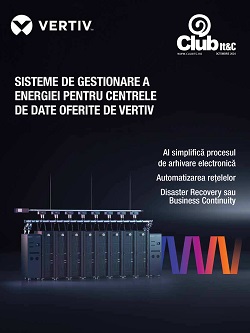Thoughtworks (NASDAQ: TWKS), a global technology consultancy that integrates strategy, design and engineering, and co-founder of the Green Software Foundation, announces the release of the first report on the state of green software.
The 2023 State of Green Software (SOGS) report is the first analysis of sustainable software, globally and across all industries, and aims to reduce its harmful impact on the environment.
 “State of Green Software brings together global insights and data from industry leaders and researchers with the goal of driving the transition to green tech and reducing the unwanted impact of software on the environment. Thus, companies are becoming more aware of the potentially harmful effects and can adopt solutions to become carbon neutral or carbon negative as governments work globally to urgently address the current climate crisis. Romanian companies are no exception, especially since our country has become a major exporter of software and we must align ourselves with global trends”, said Şerban Țîr, managing director of Thoughtworks Romania.
“State of Green Software brings together global insights and data from industry leaders and researchers with the goal of driving the transition to green tech and reducing the unwanted impact of software on the environment. Thus, companies are becoming more aware of the potentially harmful effects and can adopt solutions to become carbon neutral or carbon negative as governments work globally to urgently address the current climate crisis. Romanian companies are no exception, especially since our country has become a major exporter of software and we must align ourselves with global trends”, said Şerban Țîr, managing director of Thoughtworks Romania.
The data analyzed shows that, according to the researchers, software is expected to account for 14% of the world’s carbon footprint by 2040. The report presents a clearer picture of what works for the sustainability agenda and consolidates data that is becoming extremely useful in adopting a sustainable strategy by decision-makers.
“I have wished for a resource like The State of Green Software report for four years, and I am thrilled it’s finally here. Nobody has to spend hours anymore hunting for information that will convince leadership to invest in green software projects,” says Asim Hussain, Executive Director and Chairperson of the Green Software Foundation.
Also, the report shows that software-related CO2 emissions currently account for 4-5% of global emissions. This is equivalent to the emissions of all aviation, maritime, and rail transport combined.
Green Software is vital to a net-zero future, and SOGS survey results support the claim of nearly half of Fortune 500 companies, which have pledged to reduce emissions by 2030.
At the same time, the SOGS survey indicates that more than 2,000 software practitioners and other stakeholders are considering climate change, with 62% reporting they are very concerned and 30% saying they are concerned.
Sustainability is also key to recruiting and retaining employees. Companies with strong climate goals and sustainability initiatives may be able to attract and retain talent more easily. According to a 2019 study by Fast, 40 percent of millennials said they chose to work for an employer because of its strong sustainability performance, and 30 percent said they decided to leave a job because of poor sustainability performance.
However, the study shows that decarbonization alone is not enough for the transition to green software.
Carbon emissions are a significant part of software’s climate impact, but data-intensive technologies like generative artificial intelligence also require many other resources, including water.
Researchers from the University of California Riverside and the University of Texas Arlington wrote a paper examining the water footprint used by AI. According to them, running GPT-3 in Microsoft’s state-of-the-art data centers in the US can directly consume 700,000 liters of clean fresh water, enough to produce 370 BMW cars or 320 Tesla electric vehicles.
The 2023 State of Green Software (SOGS) report currently focuses on China, the global leader in green computing, the US, India, the UK, and Australia.
Read more information about State of Green Software.






























